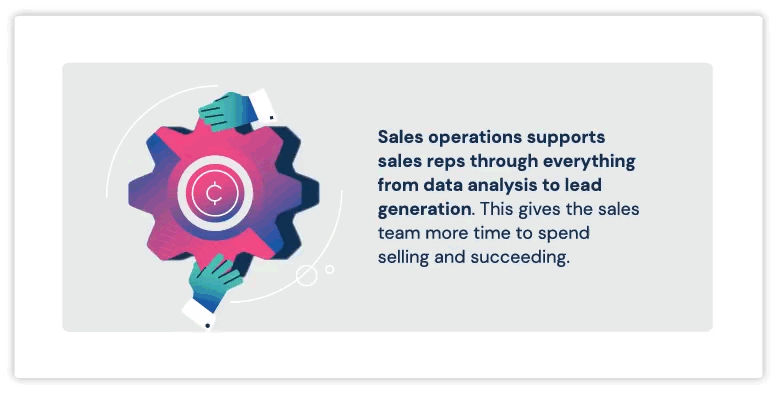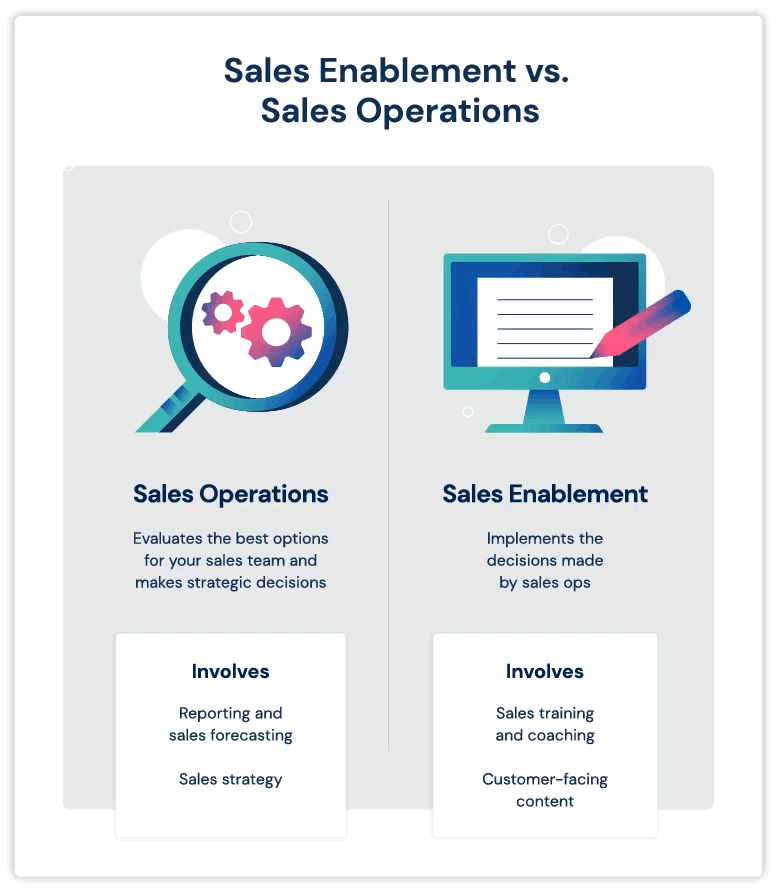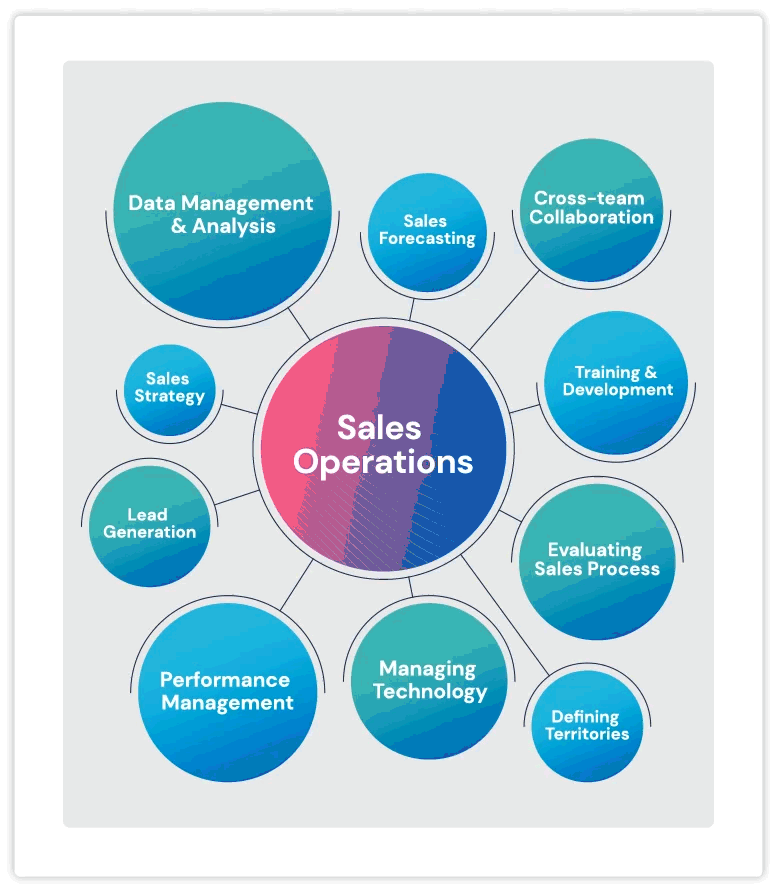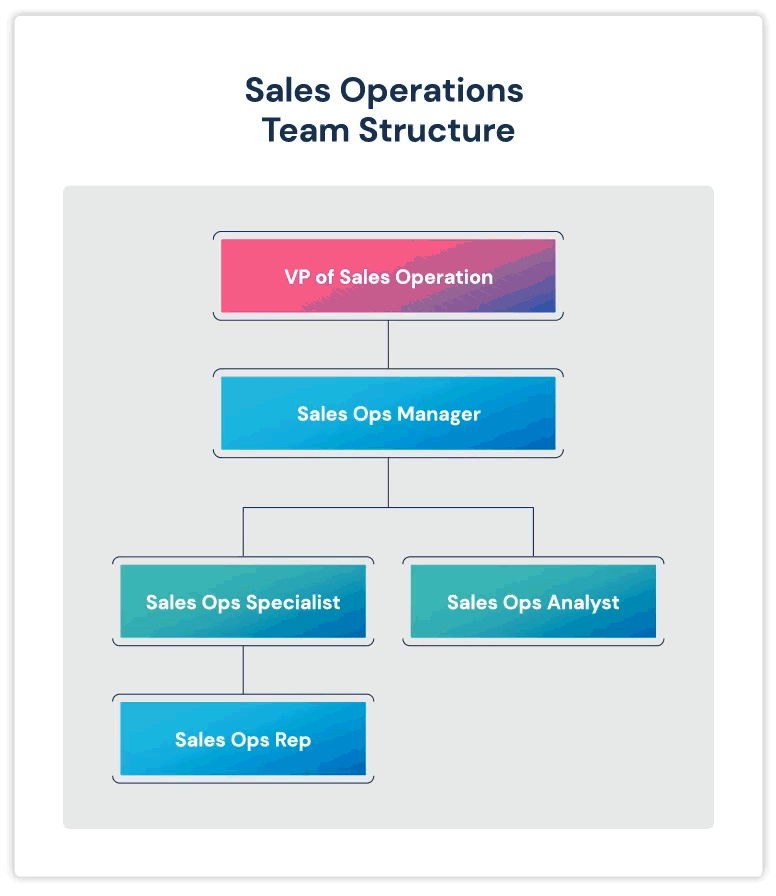Sales Operations: The Ultimate Guide [2025]

Contents
You might have the most talented salespeople in the world – reps who are exceptional at engaging prospects, asking the right questions and closing the deal – but if you don’t get the sales operations piece right, they simply won’t perform as well as they could. That’s because they won’t have the systems and processes in place to complement their natural ability.
What is sales operations? As sales engagement and automation experts, we at Mailshake understand the need for sales ops to support growing sales teams. So we’ve put together this guide to all things sales operations, with everything from the why to the how. Learn why a sales ops team is so important, their roles and responsibilities, essential techniques and KPIs to measure success.
What Is Sales Operations?
Sales operations involves providing data insights and strategies to reduce friction and support the sales team. This may include responsibilities like data management and lead generation.
In a nutshell, sales operations is all about allowing reps to spend more of their time selling, and less on things like admin, meetings and low-value, labor-intensive tasks.
By building a more efficient sales unit, sales ops helps you achieve the results you need to move your business forward.
Often, this means implementing a system for selling that ensures all reps are working toward the same goals, rather than doing their own thing.

Why Is Sales Operations So Important?
Some salespeople see operations as a barrier to their selling efforts – they think that putting structures and processes in place to define best practices and introduce a consistent approach is restricting their natural flair.
However, sales operations is valuable because it removes friction from your sales process – the stuff that’s slowing your reps down and distracting them from the all-important business of speaking to prospects.
That means they’ll be more efficient and more productive, which in turn gives them more opportunities to close deals and drive revenue.
Here are more crucial benefits of sales operations functions:
- Improves sales productivity
- Implements strategy based on data analytics
- Allows for better recruiting, onboarding, and training
- Allows sales reps to sell more
Sales Operations vs. Sales Enablement
Sales operations and sales enablement are both about positioning you to sell more, but they’re not quite the same. So, what’s the difference?
Broadly speaking, sales ops involves evaluating the best options for the sales team and making strategic decisions about those options. Sales enablement is then about implementing those decisions.
To give an example, on a strategic level, sales ops might establish that reps aren’t spending enough time on qualifying prospects, which is producing inefficiencies later on in the process. Sales enablement would then provide training sessions and materials to help reps qualify leads more effectively.
The two disciplines also tend to be involved in different parts of the sales process:
- Sales enablement: Typically involved higher up the funnel, focusing on prospect engagement and education
- Sales operations: Typically involved further down the funnel, dealing more with negotiating and closing the sale

Sales Operations Responsibilities
What does sales operations do? The specific responsibilities of the sales operations department will vary slightly from one organization to another, but broadly speaking, they’ll touch on the following areas:

1. Data Management & Analysis
You can’t build a more efficient sales process through guesswork – your decisions need to be driven by data.
That’s why sales ops needs to take the lead on managing and analyzing all relevant sales data, digging into the numbers to produce actionable recommendations.
The specific metrics and KPIs they track will depend on the numbers that matter most to your business. For example, if you only sell a single product for a fixed fee, average contract value isn’t relevant, but it might be if you offer multiple tiers or bespoke pricing.
That said, here are a few things that your sales ops unit should consider tracking:
- Average calls made/emails sent per day: Simply put, are your reps speaking to enough prospects?
- Customer acquisition cost: The less you spend on winning a customer, the sooner that account becomes profitable.
- Close rate: If you’re only closing a small proportion of deals, it’s a sign you’re not qualifying prospects effectively.
- Lifetime value: Generate more value from each customer, and your revenue will grow without you having to win a ton of new accounts.
- Sales cycle length: If your sales ops team is doing its job, you should see a reduction in the average time from first contact with a prospect to closing the deal.
2. Sales Forecasting
Forecasting is often left to sales leaders, but it’s difficult.
Spend too long on it, and the figures will quickly become irrelevant. Put too little thought in upfront, and it’ll be pretty meaningless – you might as well have just picked some random numbers.
Because the ops team has access to a wealth of data, they’re often best positioned to predict future revenue generation and activity levels. This allows sales leaders to identify potential issues before they arise and course-correct to avoid them.
3. Cross-team Collaboration & Stakeholder Management
Sales affects everyone within your organization.
The C-suite wants you to smash your sales targets. Team leaders want you to push their products. Everyone wants a pay raise, a promotion, a bigger budget or to hire new team members. And none of that is possible if the sales team isn’t performing.
Understandably, many stakeholders want to have their say on sales strategy, processes and reporting.
That’s a lot of extra noise for your front-line salespeople to deal with.
Instead of involving your reps, leave the job of stakeholder management and communications to your ops team.
4. Sales Strategy & Communication
Because they have access to all that data, and because they have a top-level view of sales processes and performance rather than getting bogged down in the deal, sales operations is in a fantastic position to develop effective new systems and strategies. This includes things that:
- Drive conversions
- Improve prospecting
- Speed up the sales cycle
Not only that, but they can also take the lead on communicating any changes in approach to sales leaders and other key stakeholders.
5. Training & Development
No salesperson is the full package. Whether they’re an experienced long-serving rep or a new starter, there’s always room for improvement – and that often comes through training.
The sales ops team will often take responsibility for creating and delivering training sessions and other collateral.
They might also build and implement a sales mentoring program to create support systems, share best practices and improve morale.
In addition, sales ops will often take the lead on training reps to use new sales software. This is because it’s often the ops team who will first identify a need for new software to make the sales process more efficient, and they’ll often choose the software as well.
6. Supporting Lead Generation
Many salespeople struggle with finding leads. It eats up a lot of their time and often doesn’t yield great results.
Sales ops can bring efficiency to this vital part of your sales operation.
For instance, they can build processes that increase alignment between your sales and marketing functions. That can help you answer questions like:
- How should sales be using buyer personas?
- Which rep should take the lead on handling marketing qualified leads?
- What sales enablement content do we need?
- Where should that content live?
7. Performance Management
Performance management is another vital part of sales that can be handled by your ops team in the form of:
- Developing compensation plans and incentives
- Creating processes for leveling up poor performance
- Building systems for acknowledging top performers
They can also take the lead on regular performance reviews, or support sales leaders on how to carry out those reviews on their own.
8. Evaluating the Sales Process
How do you assess the effectiveness of a sales campaign, a new process or a product launch?
By measuring and evaluating the data. This is a key responsibility of the sales operations function.
By digging into the numbers, the sales ops team is able to determine the success of your current sales strategies. If things aren’t working out as expected, they’re well placed to advise on a new approach or process.
Beyond this, sales ops will also use things like external benchmarks, competitor analysis and internal performance data to build out new sales strategies where necessary.
9. Managing Technology and Sales Tools
To boost sales efficiency, sales operations may work with the IT department to manage various technologies and helpful sales tools, such as the CRM or sales engagement platform.
Because there are so many sales tools out there with varying degrees of complexity, sales ops can help manage your tech stack. Sales ops can take time off the sales team’s plate by integrating apps, customizing the CRM and sales dashboard, and setting up task automation.
10. Defining Clear Territories
Traditionally, sales was all about knocking on doors. That meant every salesperson had a defined geographic territory to ensure that no one stepped on each other’s toes.
Field sales is less common today, and even when it does still happen, it’s rare that the field sales agent will be going in cold – generally, the prospect will have spoken to someone else on the seller’s side first.
However, that doesn’t mean territories are no longer relevant. They just might not be geographic anymore.
Different salespeople are naturally better at speaking to different types of prospects or dealing with different types of organizations. Some might love the immediacy and accessibility of startups, while others might thrive on the more involved, relationship-driven world of enterprise sales.
Your ops team should be taking the lead on defining territories across your sales function and assigning leads accordingly.
Sales Operations Roles
There are different positions within a sales ops team, all with important functions. Here’s a description of each type of sales operations job:
- VP of Sales Ops: This person oversees the sales ops team. As a top-level executive, they will work alongside senior leadership to manage the overall productivity of the sales team. This job may require up to 10 years of experience and/or an MBA or MA degree.
- Sales Operations Manager: This person manages a team of sales ops reps, specialists and analysts. They identify ways to streamline the sales process, and therefore need to have lots of experience in sales.
- Sales Operations Specialist: Higher up than a sales ops rep, a specialist may handle more complex data, make sales forecasts and support many stages of the sales cycle.
- Sales Operations Analyst: This person analyzes the data from sales tools like your CRM to create data-driven insights and recommendations to improve performance.
- Sales Operations Rep: This person may analyze data, use sales automation tools, conduct research, handle reports and compensation plans and help improve sales processes. This is usually an entry-level sales ops position with fewer years of required experience.
Sales Operations Team Structure
So, how is the sales operations team structured? Of course, based on specific needs, every company may structure their team differently. Here’s just one example of a sales ops team structure:

Sales Operations Techniques & Best Practices
With such wide-ranging responsibilities, it can be difficult for sales ops teams to work out what to do next.
What will make the biggest impact? Revamping lead qualification or streamlining prospecting? Improving alignment with marketing or the C-suite? Building a new training program or coaching existing sales leaders?
Here are a few general techniques for running an effective sales ops function.
1. Create a Mission Statement
It’s important to create a company-wide mission statement to align your sales ops and sales team members. A mission statement should state your overall objectives. To avoid sounding too vague or unoriginal, include clear and unique language.
Here are some examples of standout mission statements:
- Kickstarter: “To help bring creative projects to life.”
- Uber: “Ignite opportunity by setting the world in motion.”
- Starbucks: “To inspire and nurture the human spirit – one person, one cup and one neighborhood at a time.”
- LinkedIn: “Connect the world’s professionals to make them more productive and successful.”
2. Collaborate With Sales Leaders on Strategy
Sales ops doesn’t exist in a vacuum. If the measures they put in place don’t have buy-in from the front-line sales team, they’re just not going to work.
What’s more, while sales ops is great at delivering data-driven insights, they lack hands-on experience of speaking to prospects and selling your product.
That’s why all strategic decisions should be made as a collaboration between ops and front-line sales leaders.
This approach reduces the risk of the ops function making conclusions based on data that aren’t applicable or practical in the real world.
3. Set Up Analytics
Throughout this article, we’ve discussed the importance of ensuring that sales ops has access to all the necessary data.
So as a starting point, the ops unit should lead the setup of all relevant sales analytics tools.
What tools do they need? Well, that depends on the metrics they want to focus on, so they’ll also need to figure out the types of questions they want to answer down the line. Things like:
- How many calls or emails are our reps making per day?
- How big is our sales pipeline?
- How long, on average, does it take us to close a deal?
- How effectively are we qualifying prospects?
4. Build a More Efficient Sales Process
No sales process is perfect.
If you have one in place already, there’s a good chance it falls apart from time to time.
And if you don’t have a formalized process in place, you definitely need one. Otherwise, you don’t even have a sales team – you just have a bunch of individuals doing whatever they feel like.
Whatever position you’re currently in, sales ops should have all the data they need to identify inefficiencies and build something smarter. If they don’t already have the data, they should at least have the analytics tools in place to gather it.
You might want to give ops some guidance on the specific parts of your sales process that may need improvement.
Alternatively, give them free rein to scour the whole process, seek out inefficiencies and put measures in place to eradicate them.
5. Shadow Salespeople
As mentioned earlier, some salespeople view sales ops as a barrier to their selling. To dispel this idea and form a better connection between the two teams, have sales ops members regularly shadow the sales team. Shadowing salespeople once a quarter will help sales operations reps better understand the sales team’s pain points and day-to-day work.
6. Proactively Set Sales Goals
The sales ops team should always be innovating and proactively setting sales goals. To stay successful, the team should always have a forward-thinking mindset. One study showed that sales teams with a reactive strategy had quota attainment 14% lower than teams that used a proactive strategy.
Sales Operations KPIs and Metrics
How do you measure the success of a sales ops team? Here are several more examples of KPIs for sales operations:
- Win rate: Win rate or win/loss ratio, or the number of deals you’ve won to lost during a specific time period, can give you an idea of the effectiveness of the sales team. However, it can also point to the success or needed improvements in sales forecasting.
- Sales cycle length: This is the amount of time it takes for an average deal to close. Shortening the sales cycle and time to close can indicate the success of sales ops in identifying inefficiencies in the sales cycle and implementing solutions to increase productivity.
- Forecast accuracy: Since sales forecasting is a large part of sales ops, forecast accuracy is important to measure. If there are large discrepancies, you can reevaluate your process.
- Selling time: Selling time, or average sales time, is the time that reps actually spend on selling. This can give you an idea of the team’s productivity and if sales ops can do more to take non-selling tasks off their plates.
- Pipeline efficiency: Take a look at your pipeline inflow and outflow and pipeline value. You can also evaluate how many leads you have in the pipeline and the potential value of clients. A sales operations analyst can use your CRM and other tools to look at this data and improve these pipeline-related metrics.
- Close rate: This is the number of closed deals to the number of leads, serving as another measurement of the sales team’s performance at large.
- Marketing vs. sales-originated leads: Determining whether most of your leads originate from marketing or your sales team will give you insight into resource allocation.
- Customer acquisition cost: Acquiring new customers is a significant expense for businesses. Customer acquistion cost helps you understand the ROI associated with acquiring new customers.
- Customer lifetime value: This KPI will show you the total value customers add for you over their lifetime.
- Sales team workload: If your sales team is overwhelmed with the number of customer touchpoints, your sales efficiency may decrease. Implement automated workflow processes to ease the workload of your sales team.
- Sales team turnover: In order to have a fully functional team, prepare for turnover and how to mitigate it. If your turnover goes beyond 20%, your vacancies will affect your overall KPIs.
- Sales efficiency: This metric takes into account the amount of money you spend on sales vs. the number of customers that convert. You can measure this as a whole team or as individuals.
- Customer churn rate: Your churn increases when customers don’t renew their contracts. This is an important metric because it shows how well your sales team nurtures existing customers after they convert.
With this, you can take valuable information and goals into account as you build your sales operations team. While you’re at it, book a demo to see how Mailshake can help support your sales and sales ops teams by prospecting at scale.
Sales Operations Frequently Asked Questions (FAQs)
What are the responsibilities of sales operations?
Sales operations is a business unit responsible for overseeing and coordinating sales activities. It works to ensure that sales teams are efficient, effective, and organized in their routines. The team can work on tasks such as developing processes, analyzing data, creating CRM systems, and devising strategies for maximizing ROI.
What is the difference between sales and sales operations?
The main difference between sales and sales operations is that while salespeople are responsible for selling products or services to customers, sales operations focuses on optimizing the overall performance of the sales team. Sales ops teams focus on strategies, data analysis, and customer satisfaction.
How can I measure the success of my sales operations team?
Sales operations teams can be measured in terms of KPIs such as win rate, forecast accuracy, customer acquisition cost, and customer lifetime value. Additionally, look at metrics such as selling time, pipeline efficiency, close rate, and customer churn rate to better understand how your sales team is performing, which is a reflection of how the sales ops team is doing.
What should I look for when hiring for a sales operations role?
When looking for candidates to fill a sales operations role, it is important to evaluate their skills in data analysis, problem-solving, and communication. Additionally, they should have experience working with CRM systems and an understanding of finance and technology. It’s also beneficial if the candidate is familiar with process automation tools.
Who is a sales operations specialist?
A sales operations specialist is a key player in the sales operations team. Their primary responsibility is to collect and analyze more complex data to help identify trends and customer insights. They also help create reports, develop sales strategies, automate workflows, and create systems that improve the efficiency of the entire sales team.





